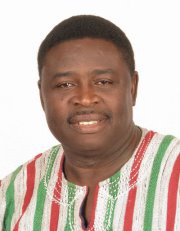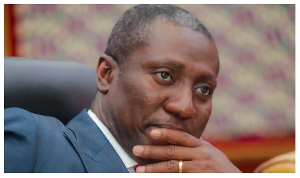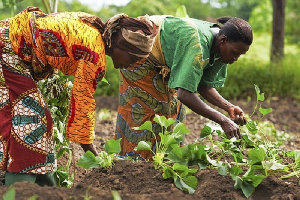Dr. Michael Abu Sakara Foster, Flag bearer of the Convention Peoples Party (CPP) on Tuesday set the character for Election 2012 with high rate performance at the Institute of Economic Affairs’ (IEA) Evening Encounter with Presidential Candidates.
Dr. Sakara took the stage majestically to deliver a twenty minutes speech which focused on CPP’s Job creation for the youth through skill building for industrialization; Patriotic Service and Job creation in mainstream economy. He also answered questions from the audience.
Other issues he touched on were the building of an integrated sugar cane industry, poultry and animal husbandry investment targets, expansion of the oil palm industry, cocoa, manufacturing and associated infrastructure, and the establishment of fertilizer plant with associated infrastructure.
The CPP flag bearer also outlined the party’s policy for construction of a network of roads to form a national grid system to link the eastern and western corridors at the coastal, mid-belt and the most north.
He said CPP was determined to make Ghana the pinnacle of Africa's achievements and to demonstrate that Africans could manage their own affairs. “CPP will ensure the state plays an active role in investment and job creation in the country.
“There shall be six-month military training for all 18 year-olds to ensure discipline and patriotism. Pupils who fail in the BECE will be given a lifeline under CPP leadership in vocational training.
“CPP will ensure District Chief Executives are elected and will also make sure that the 40 per cent quota for women appointed into public offices is respected; the Vice President will have responsibility for monitoring and evaluation under a CPP leadership,” he said.
Dr. Sakara said commitment, dedication and selfless leadership are needed to take Ghana to its rightful place and a CPP President in 2013 is ready to provide all that.
The Agronomist Flag bearer of the CPP who was a Vice Presidential Candidate of the party in Election 2008, said a CPP government will optimize the use of inland waterways for bulk transportation of goods; expand and establish an Export Free Zone at the Buipe Port to accelerate development of the inland port and its growth.
On housing, Dr. Sakara said a CPP government in 2013 will embark on an initiative to systematically provide affordable one to two-bedroom houses in serviced estates throughout the country.
“A total of 50 houses per district will be built every year with additional 500 to 1,000 units per municipal authorities depending on the population concentration; an estimated 35,000 housing units will be built per year with option for increased units.
“High content of local materials will be used in this project,” Dr Sakara stated.
Dr. Sakara also revealed that a CPP led administration will initiate interventions to fully exploit the human resources capital of more than three million Ghanaians living and working abroad.
“A CPP government under my leadership will work to allow dual citizens to participate fully in all aspects of national life. CPP will not treat our own people as second class citizens by depriving them of certain rights of their national life.
“CPP will seek amendment to the constitution to allow dual citizens to fully participate in all aspects of our national life at every level,” Dr. Sakara stated.
On mining, the CPP Flag bearer said a CPP government will renegotiate all agreements in the mining and extractive sectors to provide maximum revenue to our treasury.
The CPP Flag bearer also explained issues on gender, empowerment of communities, labour, managing the national budget and issues on foreign affairs.
Dr. Sakara noted that a CPP government will take bold and necessary measures needed to turn around the national condition through targeted interventions to prepare the country’s human resource base adequately to achieve the required skills and work ethics.
The IEA organized Evening Encounter was attended by leading members of the National Democratic Congress, New Patriotic Party, Peoples National Convention, Convention Peoples Party, Civil Society Organisations, Academia, Media Practitioners, and traditional rulers.**
Click to view details



Politics of Wednesday, 27 June 2012
Source: GNA
CPP’s Dr Abu Sakara sets tone for Election 2012

Opinions















